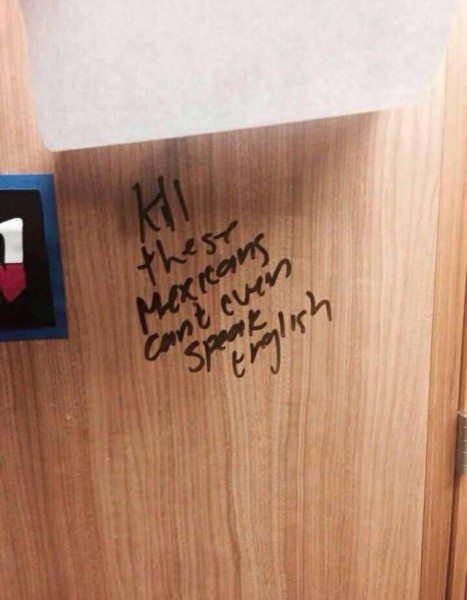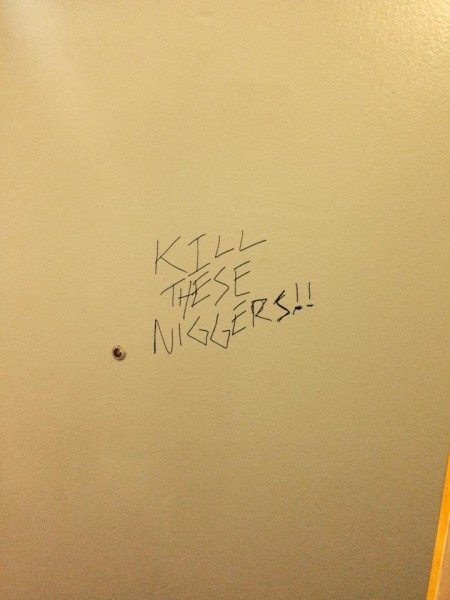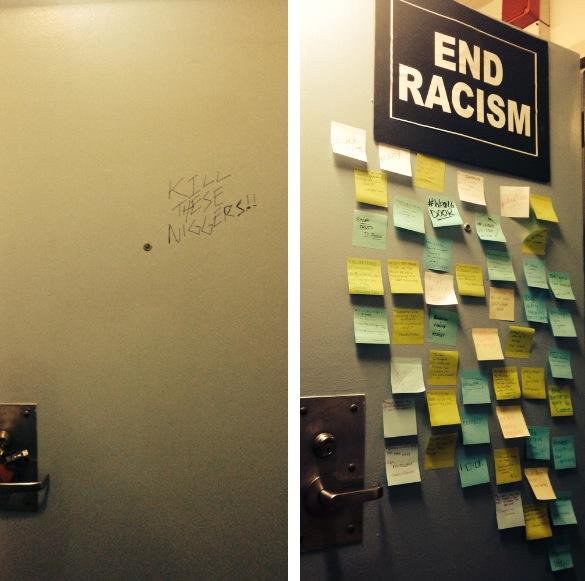UPDATE, October 20, 2014: An individual has been arraigned for a connection to both these incidents.
You walk home from the library late night thinking about the paper you have to submit by midnight. You walk back from the gym pumped up because basketball season is starting soon. You walk back from the cafeteria missing your abuelita’s sancocho and ajiaco. You walk around campus excited because it’s the weekend and your work-study money came in.
You walk back to your room and see a message scrawled on the door: “Kill these Mexicans can’t even speak English.” You are devastated, you are hurt, you are angry.
You are told that your black and brown brothers and sisters in another residence also had death threats scrawled on their doors: “Kill these niggers.”
You and your community are under attack.
You go to the emergency anti-racism meeting and you hear the Chancellor of the University state that he is “surprised” by these racist attacks.
You hear your fellow students say with one voice: We are not surprised. You hear yourself say: don’t call me a victim; I am a survivor. My existence is my resistance.
This past week has been tough for students of color at the University of Massachusetts Amherst. One of our strongest anti-racist voices, one of our most important student leaders went down to Ferguson, Missouri, to stand in solidarity with the people that have been protesting every day since the killing of Michael Brown. Josh Odam was part of the UMass contingent of students that went to Ferguson for #FergusonOctober. Upon his return to campus, Odam saw these hateful messages awaiting him. Whoever did this, did it in a premeditated and targeted fashion. The pain this week has been immense but the overwhelming sense of solidarity and immediate mobilizing has been unprecedented on our campus and absolutely beautiful to witness.
Our student body has been very active this semester in denouncing police brutality, calling for an end to the criminalization of black and brown bodies and standing strong in affirming that black and brown lives matter. We have held several public marches, speak-outs and rallies. Anti-racist activists and organizers have been spotlighted in our campus newspaper and in our campus radio show. And yet, the administration and the Chancellor do not seem to be on our wavelength; where the University calls these acts “racist vandalism,” we call them what they are: hate crimes. Where the University calls for more “diversity,” we call for social justice, safe spaces, anti-oppression curricula, anti-racism orientations for incoming students, more funding for Pell Grants, more funding for multicultural student organizations and an immediate and sustained institutional effort to recruit and retain students of color, especially those coming from working class backgrounds.
It is my sincere hope that the administrators at our University and the Board of Trustees of the UMass system get on our wavelength and learn from the students that are clearly spearheading the campaign to make UMass a safer space where students of color can focus on becoming scholars, researchers and critical thinkers. Here at UMass we are disgusted and disturbed by the racist violence that has been aimed at people of color. We are also concerned that the administration wants to downplay these acts of hate and sanitize the students’ reaction to these crimes. Rosa Clemente, a member of our afro-latin@ community, said it best, “We have no time for respectability politics in the face of white supremacist violence.”
Just like in New York where people are fighting against “Stop and Frisk,” just like in Ferguson where people are fighting against police brutality, just like at the border where immigrant children are fighting to have their humanity acknowledged; here at UMass we are fighting to end Amerikkka and create “Nuestra América.” We are embarking on a long collective journey to decolonize our minds and our campus and create a livable space where our lives are considered valuable, our ideas are respected and our voices are heard.
We, the students of color at UMass, reject the status quo because in the past few days we have seen and lived black and brown power and we want to feel it everyday.
***
Santiago Vidales is a doctoral student in the US Latin@ and Latin American Literatures and Cultures program at the University of Massachusetts, Amherst. He is also a union organizer for the Graduate Employee Organization (GEO-UAW Local 2322).






[…] https://www.latinorebels.com//2014/10/19/whose-university-our-university-a-report-on-racist-hate-crime… […]